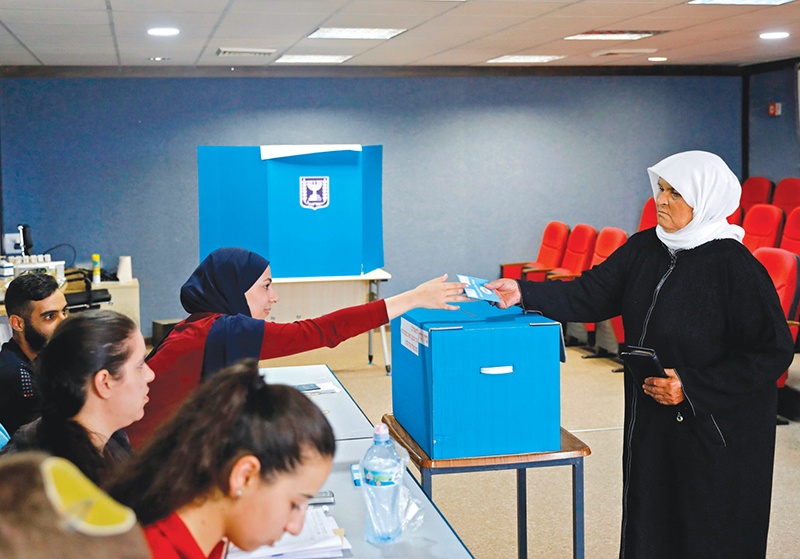
HAIFA: Israel's
Arab parties are set to be the largest non-ruling bloc in parliament - and
could even lead the opposition - if a national unity government emerges from
Tuesday's election. A surge in turnout gave the Arab-dominated Joint List 13 of
the Knesset's 120 seats, making it the third-largest grouping behind Prime
Minister Benjamin Netanyahu's right-wing Likud party, with 31 seats, and Benny
Gantz's centrist Blue and White, with 33.
That would make
the Joint List the largest opposition grouping in parliament if a unity
government takes shape, a realistic possibility even though Gantz rebuffed
Netanyahu's initial invitation. No party drawn from the 21 percent Arab
minority has ever been part of an Israeli government. But if Joint List head
Ayman Odeh, 44, becomes opposition leader, he would receive monthly briefings
from the Mossad intelligence agency and meet visiting heads of state, among
other perks.
This would
provide an outlet to voice Arab complaints of discrimination against them and
give a bigger platform to Arab parties that differ with those drawn from the
country's Jewish majority on many political debates. "It is an interesting
position, never before held by someone from the Arab population. It has a lot
of influence," Odeh told reporters outside his home in Haifa, a mixed Arab
and Jewish city in northern Israel.
But although the
Joint List will be the single largest group, other opposition parties combined
would have enough seats to block his appointment through an absolute majority
vote, analysts said. "There's no way the other parties will agree to have
Ayman Odeh as head of the opposition, and grant our community recognition and
legitimacy," said Aida Touma-Sliman, an Arab lawmaker from Odeh's Hadash
faction. Arab lawmakers often call for an end to Israel's occupation of the
West Bank and Gaza, a Palestinian state with East Jerusalem as its capital and
the dismantling of Israel's settlements in the West Bank.
'Symbolic win'
The Arab
community in Israel is mainly descendants of the Palestinians who remained in
Israel after its creation in 1948, and some in the younger generation openly
identify as Palestinian. They make up 1.9 million of Israel's 9 million
population, and often complain of discrimination in health, education and
housing, living in cities such as Nazareth and Acre in the north and Bedouin
towns in the southern Negev desert.
The Mossawa
Center rights group says Israel's state budget often favours Jews, allocating
more funds to Jewish localities and schools than to Arab ones. Some 47% of Arab
citizens live in poverty, far above a national average of 18%, it says.
However, Netanyahu's Likud party counters that its 15 billion shekel ($4.19 billion)
investment plan for the Arab sector during the last parliament was "the
largest such commitment in Israel's history", according to Eli Hazan,
Likud's foreign affairs director.
In Tuesday's
election, Odeh and his group of four Arab parties ran a united front and Arab
turnout increased sharply. That helped them regain seats lost in April when
they were divided and turnout plummeted. The Joint List held up its stronger
showing on Tuesday's rerun as a victory over what it described as an "unprecedented
campaign of incitement against the Arab public" by Netanyahu and
right-wing parties. Netanyahu made allegations of voter fraud in Arab
communities an issue in his election campaign, and sought to deploy cameras to
the country's polling centers in what Arab leaders described an attempt to
scare off voters. Israel's top court refused to allow cameras.
Eid Jbaili, a
55-year-old gym teacher from Haifa, said he boycotted the April election but
voted on Tuesday "because my community's leaders showed they could exude
unity in the face of adversity". But Jbaili was unsure an Arab opposition
leader would be able to provide anything beyond a "small symbolic
win" for his community. "We still won't be decision-makers in this
country," he said.- Reuters









